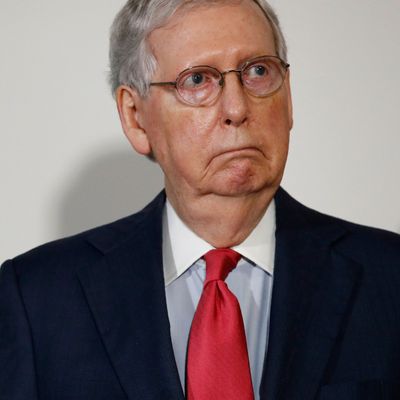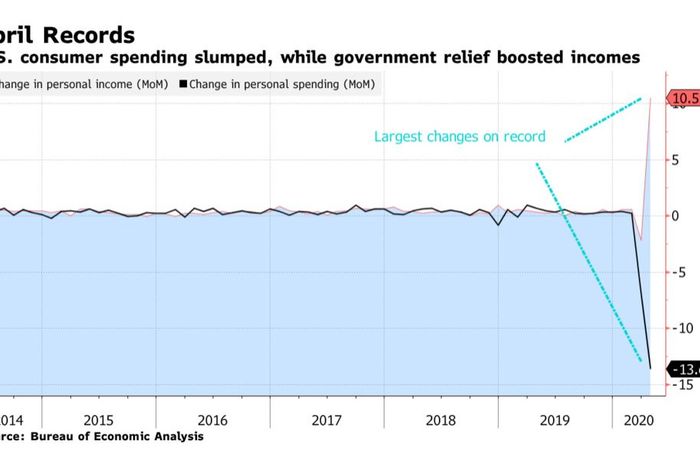
Donald Trump’s approach to guiding the United States through a world-historic public-health and economic crisis — namely, to forgo a comprehensive federal response in favor of championing an anti-malarial drug as a coronavirus panacea (over the objections of government scientists whose warnings that the drug could actually kill COVID-19 patients were subsequently validated), speculating about the curative properties of bleach injections, baselessly accusing cable news hosts of homicide, and encouraging National Guardsmen to summarily execute looters in Minnesota — has not been a political winner.
Most U.S. governors and foreign heads of state have seen sustained polling boosts for either demonstrating leadership or ably performing a facsimile of it (see Cuomo, Andrew). Trump, by contrast, saw his single-digit “rally around the flag” bump rapidly erode over the course of April. As of this writing, his approval rating stands about where it did last November.
Of course, this also suggests that the president’s grotesquely inept stewardship of the government’s coronavirus response hasn’t been a big political loser, either. Even as America’s unemployment rate has shot up to levels unseen since the Great Depression and the death toll from COVID-19 has crested 100,000, Trump remains about as popular as he was when presiding over a robust economic expansion.
In fact, in RealClearPolitics’s poll of polls, Biden’s lead over Trump has declined by two points since late March. Meanwhile, after plummeting that month, voters’ views of the economy’s strength stabilized in April (even as millions of Americans continued losing their jobs each week).
One explanation for Trump’s resilience is, in so many words, “lol, nothing matters.” Historically, an incumbent president’s fate might have been tightly wedded to economic conditions. But the correlation between presidential approval and the economy’s strength started breaking down in the Obama era. Now, in our age of hyperpolarization — in which Americans receive their political information primarily from nationally, ideologically aligned outlets rather than local putatively neutral ones — material conditions just don’t pack much punch.
But the Commerce Department’s latest economic update, released Friday, suggests an alternative possibility: For a majority of Americans, the economy is much better than it looks.
Economists had expected to see personal income in the U.S. decline by 5.9 percent in April. Instead, it rose by a record-high 10.5 percent — thanks largely to policies that congressional Democrats forced Trump to enact over his party’s strenuous objections.
In a world where the U.S. government did not spread the wealth around through transfer payments, personal income would have fallen by 6.3 percent last month. But the combination of $1,200 coronavirus relief checks (which Republicans tried to deny to the most vulnerable before Democrats objected) and a $600 weekly boost to unemployment benefits (which Republican senators attempted to excise from the CARES Act) triggered a $3 trillion increase in total government social benefits last month, up from a comparatively piddling $70.2 billion increase in March.
As a result, America just saw its highest monthly increase in personal disposable income on record. And since opportunities for (safe) consumption were severely limited, Americans also increased their rate of savings to a record 33 percent.
Now, none of this means that the COVID-19 crisis hasn’t sown extraordinary economic hardship throughout our country. Those lines outside food banks aren’t an illusion. For the millions of Americans who’ve been unable or ineligible to collect unemployment benefits, securing life’s basic necessities is now a struggle. But the Commerce Department data suggests that such privation is less widespread than many feared.
On one level, this shouldn’t be too surprising. America’s economic plight looks catastrophically worse than those of many European nations, where unemployment has barely increased. But comparing the U.S. and Danish unemployment rates is a tad misleading. Although the disparity does reflect divergent levels of worker power in each nation, it also reflects a relatively arbitrary distinction in how each nation has dispensed emergency aid. In total value, America’s relief payments have been comparable to those dispersed by many Western European governments. But whereas Denmark and Britain have structured those payments as wage replacements — routing the money through employers who agree to keep workers on the payroll — the U.S. has routed much of it through unemployment insurance. From the standpoint of the sidelined worker, at least in the immediate term, there isn’t a huge difference between whether relief comes directly from the government or from an employer that received it from the government. Either way, that money allows them to maintain some approximation of their pre-pandemic living standard.
All of which is to say: It’s possible that the actual reason the imploding economy hasn’t tanked Donald Trump’s popularity is that the economy is not actually imploding.
But Republicans are working to fix that posthaste. As the Washington Post reports:
Republican lawmakers have repeatedly expressed concern that the increase in unemployment benefits approved by Congress in March rewards workers for staying home and could lead to increased unemployment … Senate Republicans are largely unified around scrapping the extra unemployment benefits after July.
The GOP has loosened its commitment to sabotaging recovery (and, thus, its own electoral prospects) somewhat. Whereas weeks ago, Mitch McConnell expressed skepticism about the need for any additional fiscal aid to states or households, the party is now onboard for another relief package of some kind. One idea gaining traction in the caucus is to encourage unemployed workers to return to their (potentially unsafe) jobs by providing them with a weekly $450 bonus. There are a few obvious problems with this proposal as a replacement for enhanced unemployment benefits. Even the most bullish of economists believe the U.S. is going to have double-digit unemployment for months. Which means that millions of Americans are not going to have the option of being seduced back into the labor market by a government bonus. And those Americans are going to struggle to meet their liabilities and basic expenses if they’re forced to subsist on less than $400 a week in unemployment benefits instead of the nearly $1,000 they can currently access, thanks to the CARES Act.
Furthermore, the GOP proposal aims to solve a problem that does not exist. Under existing law, if a furloughed employee turns down an offer to return to work, they lose eligibility for unemployment benefits. And even if this were not the case, it’s not necessarily in the public interest for nonessential workers to reenter the labor force at this point; daily coronavirus cases are still rising in more than a dozen states. On the list of problems the U.S. economy currently faces, “there are too many unfilled jobs because unemployment benefits have left workers without any motivation to join the labor force” ranks just below “there isn’t enough unwanted oil sitting in warehouses.”
Finally, the injustice that Republicans say they wish to abolish by ending enhanced unemployment benefits – the fact that some grocery store employees who are showing up for work at great personal risk now earn less than many non-working people – is not actually redressed by their proposal. While Democrats have called for giving “hazard pay” to essential workers, the GOP’s plan would establish an arbitrary pay differential between workers returning to the labor force and the “essential” ones who never left it.
All this said, the fact that Republicans would favor substantively cruel and incoherent economic policies isn’t surprising. It’s the political madness of their position that’s noteworthy. Even with fiscal aid robust enough to keep Americans’ incomes growing amid a deepening recession, Donald Trump trails Joe Biden by an average of 5.3 points in national polls. Democrats are trying to help the president keep himself in contention by keeping the economy afloat, while Republicans are trying to kick the legs out from under it.































